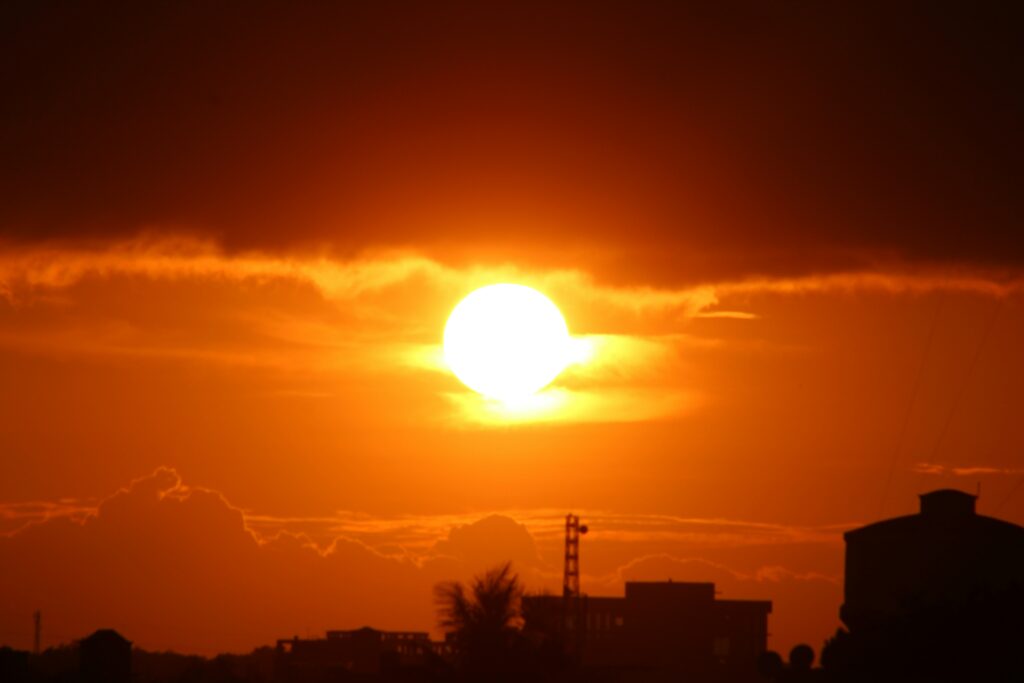The Economist’s take was “The rise of the truly cruel summer/ Deadly heat is increasingly the norm, not an exception to it”. The dateline was June 26, 2024, on which the actual high in London was 82F or 27.7C; at time of writing the high was 68F or 20C. In one sense the summer has been brutal. Namely for those who wanted all scorching all the time and even proclaimed it ahead of time. As Climate Change Dispatch observed, despite a prediction of “summer of hell with almost complete certainty” in Europe, Germany had below-average temperatures in June. It wasn’t even hot everywhere in the United States. Which AP made all about climate with “Much of US braces for extreme weather, from southern heat wave to possible snow in the Rockies” and spoke of a “chaotic weather map”. Atop a dogmatic climate one in which everything including rain in Florida is due to you-know-what: “The damaging no-name storm system coincided with the early June start of hurricane season, which this year is forecast to be among the most active in recent memory amid concerns that climate change is increasing storm intensity.” Not that storm intensity is increasing. But who cares?
The year of 2024 will stand out forever in human memory for the way it got hot in midsummer everywhere except where it didn’t. Alarmists couldn’t get enough of it; Bill Nye of the blowtorch demo and mouth enthused that “we have a situation where we’re going to have this extreme heat and these crazy heat domes, these high-pressure systems that don’t move, and there are no clouds to reflect sunlight into space; they just get hotter and hotter”. Reuters “Weekend Briefing” email shrilled “Summer heat scorches the northern hemisphere” and its “Sustainable Switch” shrieked “The cross-over between climate change and its impact on health is the focus of today’s newsletter as extreme heat waves have taken the lives of hundreds in India and Saudi Arabia this week.” They’re just reveling in it.
The New York Times went with “The Northeast and the Midwest are in the midst of a major heat wave. We asked emergency room doctors around the country what the public should know about extreme heat.” And “A hot new base line” with heatwaves of yore just weather but this one climate certainly for sure definitely no question.
The Boston Globe cranked up the heat with:
“This heat dome is really on another level. The city has smashed a high temp record, as the heat index soared to a preposterous 108 degrees on Wednesday amid the brutal mid-June heat wave. The high temp of 98 degrees at Boston Logan International Airport broke the previous high temp record of 96 degrees on June 19, 1923.”
To be blunt we care more about the temperature than the “heat index”. And in case you’re curious yes, Logan International Airport did exist in 1923, though only from September 8 onward, and was then a rural spot with the occasional propellor plane. Today it’s 2,384 acres of heat-trapping asphalt, cement and other man-made objects and substances with six runways, four passenger terminals and 16,000 employees and is the busiest airport in the U.S. Northeast outside metropolitan New York, with nearly 400,000 flights a year. Yes, that’s right, more than 1,000 per day. Just the place for an uncontaminated temperature signal. Yet they can only beat the number from a century ago by a narrow margin on one unusual day.
Meanwhile the vultures at the Globe & Mail swooped in with “Extreme heat linked to nearly 700 excess deaths in Canada’s major cities over 20 years, Statscan report says” which only really proves that journalists should not work at statistical agencies. If you do the math it comes out at 35 excess deaths across a dozen major cities a year, so fewer than three per city. Can you say “statistically insignificant”? And how many excess deaths do you suppose cold has caused? So of course the reporter found an expert who says who “said she is concerned the Statscan report may be underestimating heat-related mortality.” Who needs facts when you have the truth?
Or, for that matter, the kitchen sink, as the New York Times “Climate Forward” tells us “The heat crisis is a housing crisis”, Euronews.green says “Heatwaves do discriminate” (women hardest hit) and Reuters chortles “From Black Sea to US Midwest, extreme weather threatens crop output” almost exactly as if world food production were not setting new records almost every year. Can’t get enough of that climate crisp, climate crisp, climate crisp…
According to the actual “Weekend Briefing” story about the scorchy thing:
“Deadly heatwaves are scorching cities on four continents as the Northern Hemisphere marks the first day of summer, a sign that climate change may again help to fuel record-breaking heat that could surpass last summer as the warmest in 2,000 years.”
So again the news of the future, with a dash of creative writing. Exactly which cities got “scorched” is hard to determine. But it’s also curious that they went with “warmest in 2,000 years”, apparently admitting the Roman Warm Period was warmer. Or merely prating of they know not what, since the piece also said:
“India’s summer period lasts from March to May, when monsoons begin slowly sweeping across the country and breaking the heat. But New Delhi on Wednesday registered its warmest night in at least 55 years, with India’s Safdarjung Observatory reporting a temperature of 35.2 C (95.4 F) at 1 a.m. Temperatures normally drop at night, but scientists say climate change is causing nighttime temperatures to rise. In many parts of the world, nights are warming faster than days, according to a 2020 study by the University of Exeter.”
Well, sort of. Nighttime temperatures rising faster than daytime ones is actually a very familiar fingerprint of the Urban Heat Island effect. But why talk science when you can talk calamity? (As for “The World Meteorological Organization says there is an 86% percent chance that one of the next five years will eclipse 2023 to become the warmest on record” we leave such mathiness to those who enjoy it.)
Not to be outdone, the New York Times had “Asia’s Heat Wave Scorches Hundreds of Millions”. Maybe go with “broils” next, then “incinerates”?
Then possibly “never mind”. And not only because the Times somewhat anticlimactically said:
“Asia’s heat wave isn’t happening in a meteorological vacuum. Last year was Earth’s warmest by far in a century and a half.”
A century and a half? What, now you’re conceding the Medieval Warm Period? But even so you could at least include the last five centuries, the period since the Little Ice Age which, if you admit it happened, began around 1400 so things were unusually chilly for a while before mercifully warming again.
Anyway, the whole thing might just be hype. Being inclined to spend our leisure time in odd ways, for instance listening to “Yours Truly, Johnny Dollar“ old-time radio episodes, we recently noted that the July 21, 1957 episode “The Yours Truly Matter” involved heat in Nevada so intense, at 118°F as a high and still over 100°F near midnight, that the bad guys and good guys alike had to run a slow-motion chase to avoid collapsing. When we checked in late June the temperatures even at Harry Reid International Airport in Las Vegas were ten degrees below that mark.



I suspect that there were probably way more than three deaths a day average in those dozen major Canadian cities during the hot summers of the 1930's,when there was no AC to speak of,and perhaps no StatsCan to record this.Probably all the heat "records" discussed above are attributable to the
Heat Island Effect.Where I live,so far,summer is normal,far as I'm concerned.Some hot days for sure,but ample rain,great for farming.Have not needed
my water sprinkler even once so far,can't remember last time I went this long without it.
My area has seen adequate rain but cool temperatures so far this year. Farm crops look quite good. It has been a little cool for some garden production but there is time. This is south-east of Edmonton. Alberta.
Cooler than normal but frost has been mostly absent in May and June.
Of course, the climate changes as every season is different and every variation changes the average data for the period. Nothing unusual here. Just a normal variation.
I am over 80 years old and I think that basing a climate on 30 years of data is ridiculous. Many cycles seem to exceed 30 years. Of course, not many have seen as much climate as we octagenarians.
Here on the South Coast of England (advertised as the Sunshine Coast) the hot summer lasted three days. Back to overcast and cool. I'm sure the computer programmes show something different
Some seasons in some years are warmer than others, some are cooler than others. This is what we call 'weather'. However, if you're a journalist, any slight change in the weather must be cited as evidence of climate change, not necessarily because you are a mathematical moron (although this categorization seems to apply to most products of today's universities), but because your job is to dramatize everything to the greatest extent possible. After all, who wants to read that the weather is within normal limits, ho hum.
“Euronews.green says “Heatwaves do discriminate” (women hardest hit)”. Try telling that to the thousands of men who work outdoors all summer, in paving, construction, roofing, landscaping, power line maintenance, etc. if they are going to play the “disproportionately affected” game they should at least be fair about it.
Here in central BC we've been in a slowly worsening drought situation for two years, so naturally the experts said it was due solely to climate change and only going to keep getting worse.
Except it's been cooler and wetter than normal for the past 3 months. Somehow the experts haven't noticed that and insist we're still in drought conditions.
Well glory halleluiah, the alarmists are celebrating. At last the forecast is calling for a week-long heat wave (finally some summer weather) and the news is full of dire warnings and doomsday prognostications again.
Being an MSM journalist is a disgraceful way to make a living. They propagate lies and propaganda to feed themselves.
I live in South Central Texas. We sometimes get temps in the 80s in December. 82 on the 1st day of summer would be fairly cool. I kinda want warmer temps in winter. Our central heat/air uses a heat pump for heating. Those things don't work well if it gets too cold.
I live in South Australia. Our BOM (Bureau of Meteorology) says that we are warming faster than the world. ? We have had the coolest summers than I, as a outdoor worker can recall, certainly for past 5 years.
This winter is brutal . However it was to be the driest and hottest winter. Where can I get a job where I can say anything??